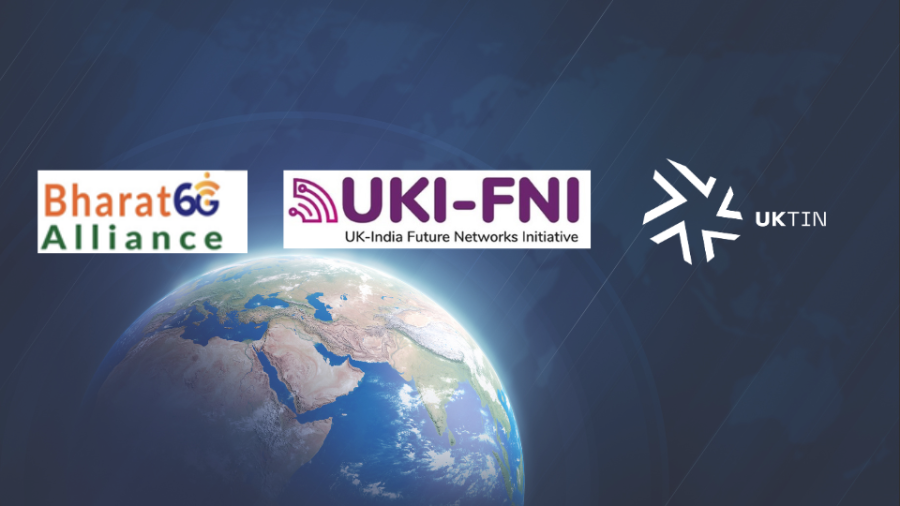
Today, we announce an important milestone in the continuing development of UK-India Collaborations in Telecoms Research & Innovation by the signing of an important MoU between Bharat 6G Alliance and the UK-India Future Networks Initiative (UKI-FNI), supported by UK Telecoms Innovation Network (UKTIN).
The Bharat 6G Alliance is established as a not-for-profit Society under Indian laws (https://bharat6galliance.com/). It is an alliance of Indian industry, academia, national research institutions and standards organizations facilitated by the Government. The vision of Bharat 6G Alliance is aligned with the Bharat 6G Mission of the Government of India to design, develop and deploy technology and innovations that provide an intelligent and secure solution for high quality living experience of citizens in India and across the world.
The UKI-FNI Project (https://www.ukifni.org/) has been a community-driven response in support of wider UK government strategies in Future Telecoms with India and it seeks to bring together electrical engineering, electronics, communications, networking, mathematics and computer science academics and industrial innovators to enable better direction and coordination of research to tackle Future Telecoms Challenges. Specifically, it coordinates discussions and formulations of solutions to key technical challenges that need to be addressed as part to a future telecommunications infrastructure. The project is led by the University of East Anglia in Norwich, together with internationally-renowned research academics from University of Surrey, Southampton University and University College London and it has been open to access for the wider UK Telecoms community with direct engagement from partners in India such as IIT Delhi and IISc Bangalore.
The UK Telecoms Innovation Network (UKTIN ) is the innovation network for the UK telecoms sector bringing together industry, government stakeholders and academia to catalyse R&D investment, cooperation and commercialisation. The group was established to provide strategic direction and thought leadership in advancing the UK’s research and innovation in future networks. As a part of UKTIN, the team hopes to act as a bridge between the UK academic research community, funding bodies and industry stakeholders. The role is to help create technology roadmaps with a time horizon of 2030 and beyond, aligning with academic research priorities and the future needs of society and industry.
Telecoms Networks are vitally important to the economies of the world, connecting and empowering people, devices and critical infrastructure on which are societies depend. Every area of our daily lives is impacted by digital technologies, be it mobile phones, smart TVs, gaming, film industry, connected cars, social media, on-line education and financial services, to name but a few. They all have one thing in common….they rely on connectivity to a well-designed Telecoms Network to provide access to content and services over either a wireless, copper, optical or satellite communications network….sometimes in combination.
Speaking of the MoU, NG Subramaniam - Chairman - Bharat 6G Alliance stated:
“I am delighted for this strategic partnership with UK-India Future Networks Initiative (UKI-FNI) and the UK Telecoms Innovation Network (UKTIN). This collaboration signifies a crucial step towards harnessing the combined strength of Indian and UK expertise to drive innovation in the development of 6G technology. As we look to the future, this partnership will not only address critical technological challenges but also create opportunities for deeper research collaboration, knowledge exchange, and shared vision for building a robust and sustainable 6G ecosystem.”
Professor Gerard Parr, the Lead of the UK-India Future Networks Initiative commented:
“I am delighted to facilitate this MoU with Bharat 6G Alliance and to further develop opportunities for collaboration and sharing of knowledge in such a strategically important area. Whilst great strides have been taken over the years to enhance the performance, robustness, scale, coverage, intelligence and cyber security of our Telecom Networks, much research still needs to be done to cope with the every-increasing amount of data that is generated in real-time by people, devices and AI tools”
The UK and India have a long-standing record of internationally leading collaboration in the ICT sector. The initial activities started in 2008 under the India-UK Advanced Technology Centre (IU-ATC) which was sponsored by the UK Engineering & Physical Sciences Research Council(EPSRC) and the Government of India Department of Science & Technology (DST). This collaboration laid the foundations for spin-off projects, Masters and PhD projects, visits by Faculty to each country, joint conferences and knowledge exchange events with industry, all in the Telecoms sector.
Commenting on the collaboration, Ian Smith , Head of UK Telecommunications Innovation Network (UKTIN ) stated:
“The UK and India share a rich history of collaboration and with many of India’s priority tech areas closely aligning with the UK’s strengths in telecoms, there are natural synergies that can be exploited and advanced through closer collaboration. The signing of this MoU is an exciting step to facilitating that and I look forward to supporting cooperation through UKTIN.”
The purpose of this Memorandum of Understanding (MOU) is to create a framework for collaboration and cooperation between India’s Bharat 6G Alliance and UK-India Future Networks Initiative, aiming to promote research, development, and standardisation of 6G and related technologies. Areas of Collaboration and Co-operation may include:
- 6G Vision and Next Generation network innovation;
- Discussions on basic system concepts, architectures and use cases such as mixed reality, holographic and multi-sensory communication, interactive 3D virtual digital humans, collaborative robots, and automated driving;
- Identification of common interests, building of consensus and collaboration to support development of globally harmonised standards for Beyond 5G and 6G;
- Strengthening global cooperation in 5G/6G technology and Future Networks;
- Use cases of 6G and other topics linked to TN-NTN applications and services Integration;
- Understanding future 6G wireless edge data processing and storage requirements;
- Minimizing 6G’s energy consumption and carbon emissions;
- Providing the enabling infrastructure for ISAC in support of large-scale demonstrators, e.g., monitoring major Climate events- environmental disasters, digital health, utilities;
- Network-enabled AI Systems and Services- AI (Distributed AI)- Identifying the importance of underlying telecoms to provide the real-time performance required to support the AI services and tools;
- On Skills pipeline- to explore development of Mobility and Exchange Programmes for Visiting Scientists /Engineers and students in a Joint Centre for Doctoral Training in Future Telecoms Research & Innovation to include academia and industry;
- Engaging with vertical industries to shape TN-NTN industrial scale use cases;
- Technology exploitation and dissemination to ensure awareness, understanding and involvement and finally adoption of new Network hardware and control-management systems;
- Participation of members of Parties in each other’s events.
The collaboration between Bharat 6G Alliance, UKI-FNI and their partners, will provide a forum for knowledge exchange, new partnerships and collaborations to help shape the architectures and systems required for Future Telecoms Networks.









